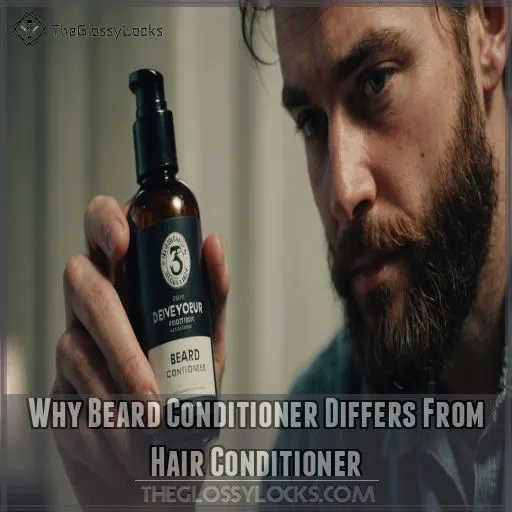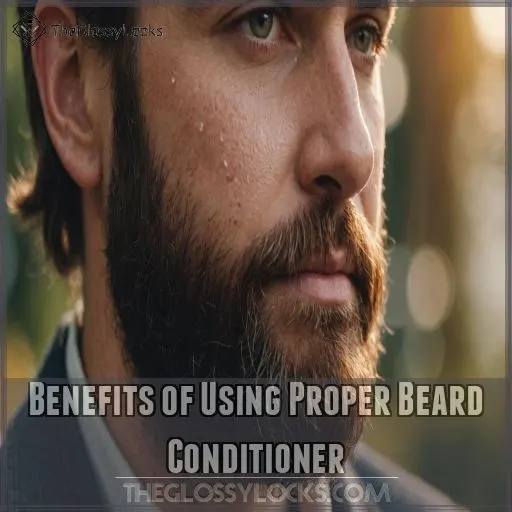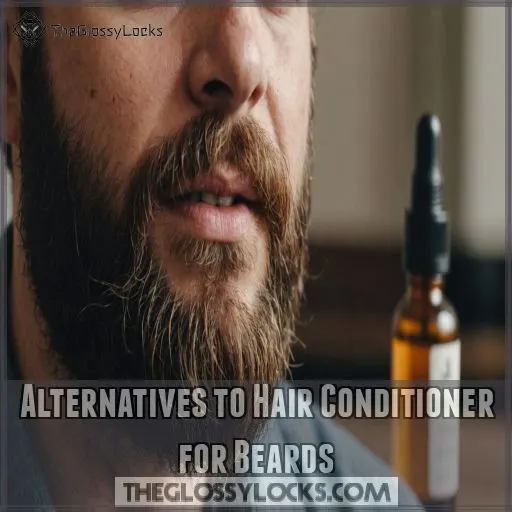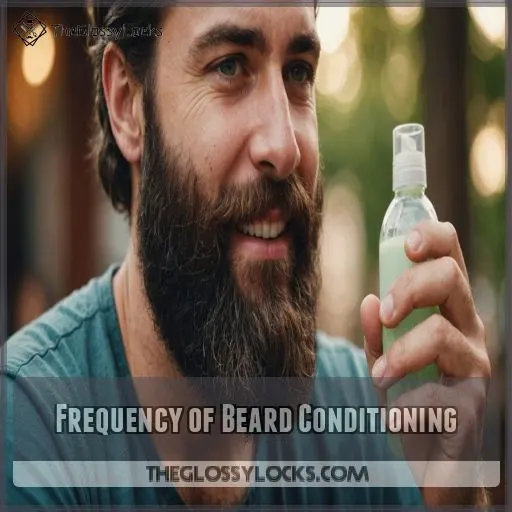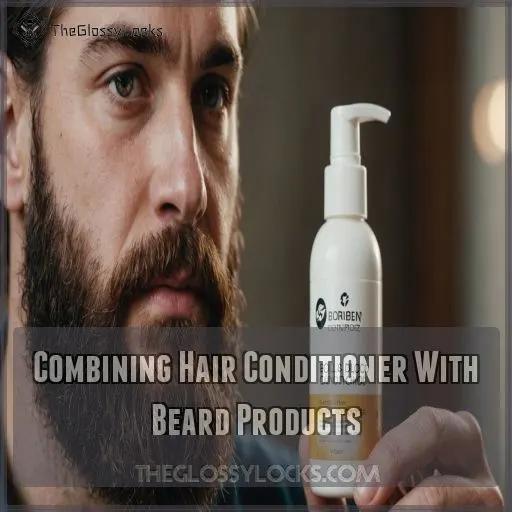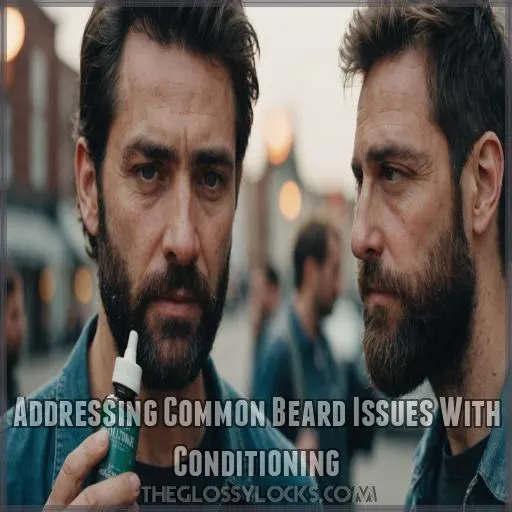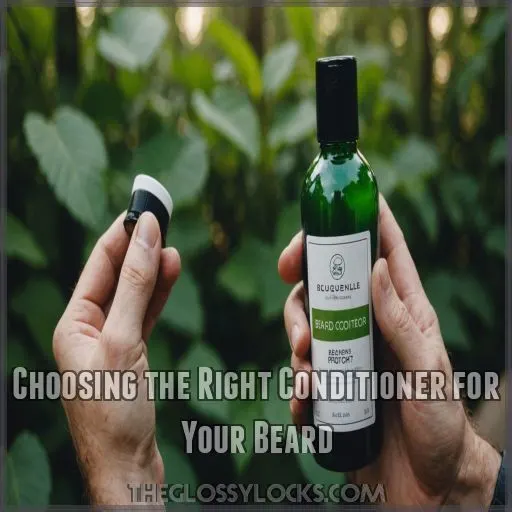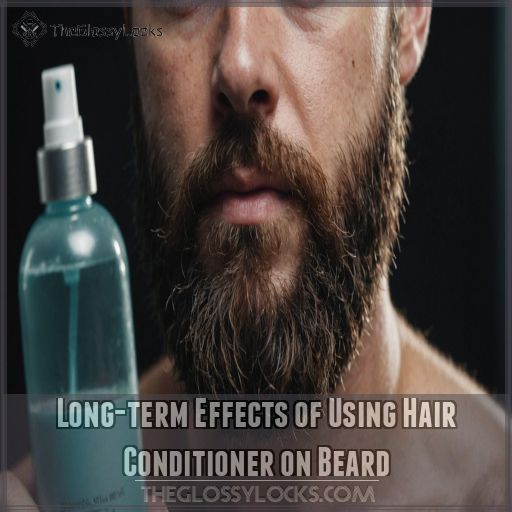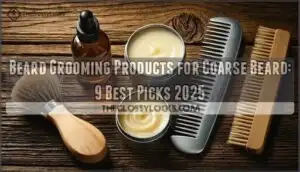This site is supported by our readers. We may earn a commission, at no cost to you, if you purchase through links.
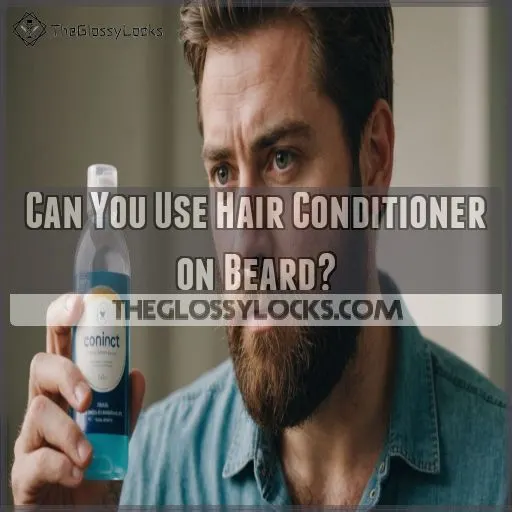 While you might be tempted to use hair conditioner on your beard, it’s not the best idea.
While you might be tempted to use hair conditioner on your beard, it’s not the best idea.
Your facial hair and skin are different from your scalp, and they need special care.
Hair conditioner can actually zap moisture from your beard, leaving it brittle and lackluster.
Plus, it might irritate your skin, causing redness or even breakouts. Yikes!
Instead, opt for a beard-specific conditioner that’s formulated to keep your facial fuzz soft, manageable, and healthy.
These products are designed to work with your beard’s unique needs, providing the right balance of moisture and nourishment.
Trust us, your beard will thank you for treating it to the VIP experience it deserves.
Table Of Contents
- Key Takeaways
- Can You Use Hair Conditioner on Beard?
- Why Beard Conditioner Differs From Hair Conditioner
- Benefits of Using Proper Beard Conditioner
- Alternatives to Hair Conditioner for Beards
- How to Apply Conditioner to Your Beard
- Frequency of Beard Conditioning
- Combining Hair Conditioner With Beard Products
- Addressing Common Beard Issues With Conditioning
- Choosing the Right Conditioner for Your Beard
- Long-term Effects of Using Hair Conditioner on Beard
- Frequently Asked Questions (FAQs)
- Can you use hair conditioner on beard hair?
- Can you use hair products on a beard?
- What can be used as beard conditioner?
- How long to leave conditioner in beard?
- Can beard conditioner be used on head hair?
- Does beard conditioner affect beard color or texture?
- Are there DIY beard conditioner recipes?
- How long should beard conditioner be left on?
- Can beard conditioner cause acne or skin irritation?
- Conclusion
Key Takeaways
- You’re better off skipping the hair conditioner for your beard. Your facial hair and skin are different from your scalp, so they need special care. Using regular conditioner can actually dry out your beard and irritate your skin – not exactly the rugged, handsome look you’re going for.
- Opt for a beard-specific conditioner instead. These products are like a tailor-made suit for your facial fuzz, providing just the right balance of moisture and nourishment. Your beard will thank you by becoming softer, more manageable, and healthier overall.
- Don’t panic if you’re in a pinch – hair conditioner can work as a temporary solution. However, for the long haul, you’ll want to invest in proper beard care products. Think of it like using a spatula when you can’t find your comb – it’ll do for now, but it’s not ideal.
- Remember, your beard is like a delicate ecosystem. Using the wrong products can lead to dryness, brittleness, and even skin issues over time. Treat your facial hair right, and it’ll reward you with a luscious, head-turning mane that’ll make even Samson jealous.
Can You Use Hair Conditioner on Beard?
You’ve probably wondered if you can use your regular hair conditioner on your beard.
While it’s tempting to reach for that familiar bottle, there are some important differences between scalp and facial hair that might make you think twice.
Differences Between Scalp and Facial Hair
You might think your beard and scalp hair are twins, but they’re more like distant cousins. Here’s why:
- Hair growth rate: Your beard grows faster than your scalp hair.
- Oil production: Facial skin produces less oil than your scalp.
- Thickness and texture: Beard hair is typically coarser and more wiry.
These differences mean your beard needs special TLC. Regular conditioner might work in a pinch, but beard-specific products are your ticket to a luscious, itch-free mane.
Potential Risks of Using Hair Conditioner on Beard
The beard-bearer beware! While it might seem harmless, using hair conditioner on your beard can lead to some hairy situations. Let’s take a look at the potential risks:
Skin irritation can cause an itchy, red face.
Product buildup can result in a greasy, heavy beard.
Unwanted shine can create an artificial, glossy look.
Dryness can lead to brittle, damaged hair.
| Risk | Impact | Solution |
|---|---|---|
| Skin irritation | Itchy, red face | Use beard-specific products |
| Product buildup | Greasy, heavy beard | Opt for lightweight formulas |
| Unwanted shine | Artificial, glossy look | Choose matte beard softeners |
| Dryness | Brittle, damaged hair | Seek moisturizing beard conditioners |
Impact on Beard Texture and Appearance
With hair conditioner on your beard, you might notice some surprising changes.
While it can initially soften your facial hair, it’s not designed for beard care.
Your mane might lose its natural luster and become limp, lacking the fullness you desire.
Regular use could leave your beard feeling greasy and unmanageable.
For that rugged, well-groomed look, stick to beard-specific products that enhance texture and appearance.
Effects on Skin Underneath the Beard
While hair conditioner might make your beard feel softer, it’s not doing your facial skin any favors.
Regular conditioners can clog pores, leading to pesky ingrown hairs and unwanted acne.
Your face’s delicate skin needs special care, and harsh ingredients in hair products can strip away natural oils, causing dryness and irritation. For example, using a hair conditioner with a preservative like potassium sorbate can help extend the shelf life of the product and prevent the growth of bacteria.
Think of your beard as a garden – it needs the right soil (skin) to thrive!
Why Beard Conditioner Differs From Hair Conditioner
You might be tempted to use your trusty hair conditioner on your beard, but hold up! Beard conditioners are specifically formulated for facial hair and skin, with unique ingredients and properties that set them apart from their scalp-focused counterparts, especially when considering the cause of beard acne.
Specific Formulation for Facial Hair and Skin
You might be tempted to slather your regular hair conditioner on your beard, but hold your horses! Beard conditioners are specially formulated for your facial fuzz and the delicate skin beneath.
Here’s why they’re different:
- Perfect pH balance for facial skin
- Gentler cleansing agents to prevent irritation
- Specific moisturizers for coarse beard hair
Think of it like this: using hair conditioner on your beard is like wearing shoes on your hands – it just doesn’t fit right!
Key Ingredients in Beard Conditioners
Beard conditioners pack a punch with their unique blend of ingredients made for facial hair.
Let’s take a closer look at the key players that set these products apart from regular hair conditioners:
| Ingredient | Purpose | Benefit |
|---|---|---|
| Natural oils | Moisturize | Softens beard |
| Aloe vera | Soothe | Reduces irritation |
| Essential oils | Nourish | Promotes healthy growth |
These powerhouse components work together to tame your mane, leaving you with a luscious, manageable beard that’ll turn heads.
PH Balance Considerations for Facial Use
The delicate balance of your facial skin’s pH is a key factor in beard care.
Unlike your scalp, your face requires products specifically formulated to maintain its natural acidity.
Here’s why pH matters for your beard:
- Prevents irritation and dryness
- Enhances natural shine and softness
- Promotes healthy hair growth
By choosing a beard conditioner with the right pH balance, you’re not just pampering your facial hair – you’re creating the perfect environment for a thriving, lustrous beard.
Moisturizing Properties Tailored for Beards
Ever wondered why your beard needs special treatment?
Well, it’s not just about looking good.
Beard conditioners are like a tailor-made suit for your facial hair, providing just the right moisture balance, just like the beard conditioners mentioned in the article.
Unlike regular hair products, these bad boys are packed with natural oils like argan and jojoba, which work wonders for your beard’s unique needs.
It’s like giving your face-mane a spa day, every day!
Benefits of Using Proper Beard Conditioner
You might be tempted to reach for your regular hair conditioner, but using a proper beard conditioner can make a world of difference.
Beard-specific products are worth the investment and can transform your facial hair game.
Softening and Detangling Beard Hair
Your beard’s unruly nature can be tamed with the right conditioner.
Proper beard conditioners work wonders, transforming coarse whiskers into silky-smooth strands.
They’re like a magic wand for your facial hair, effortlessly detangling knots and making grooming a breeze.
You’ll notice a significant difference in texture and manageability, making styling easier than ever.
Say goodbye to those frustrating tangles and hello to a beard that’s soft to the touch and easy to manage.
Reducing Itchiness and Beardruff
Itchy beard? Flaky skin? Don’t let beardruff rain on your parade! A proper beard conditioner is your secret weapon against these pesky problems.
It’s like a soothing balm for your facial forest, calming irritated skin and banishing those dreaded white flakes.
By moisturizing both hair and skin, you’ll say goodbye to scratching and hello to a comfortable, itch-free beard.
Trust us, your face will thank you!
Improving Overall Beard Health and Appearance
Beyond taming itchiness, proper beard conditioner works wonders for your facial mane’s overall health and appearance. It nourishes hair follicles, promoting stronger growth and reducing breakage.
The right formula can add a healthy shine, making your beard look fuller and more vibrant.
Plus, it helps balance the skin’s natural oils, preventing dryness and flakiness. With regular use, you’ll notice a softer, more luscious beard that turns heads for all the right reasons.
Enhancing Manageability and Styling Ease
A well-conditioned beard isn’t just healthier; it’s also a dream to style.
Proper beard conditioner transforms unruly whiskers into manageable masterpieces.
You’ll find your beard brush gliding through knots with ease, and your comb becoming your new best friend.
Whether you’re aiming for a sleek corporate look or a rugged outdoorsman vibe, the right conditioner makes sculpting your facial hair a breeze.
It’s like having a secret weapon in your grooming arsenal!
Alternatives to Hair Conditioner for Beards
Wondering if there’s a better option than hair conditioner for your beard? Let’s explore some beard-friendly alternatives that’ll keep your facial hair soft, healthy, and looking its best.
Beard Oils and Their Conditioning Effects
Countless beardsmen swear by beard oils as a stellar alternative to hair conditioner, like those found on this list. These liquid gold elixirs work wonders for your facial mane, offering deep conditioning without the heaviness.
Here’s what beard oils can do for you:
- Tame unruly whiskers like a lion tamer
- Moisturize dry skin, banishing the dreaded beard itch
- Add a healthy sheen, making you look like a rugged movie star
Plus, they’re a breeze to apply and come in scents that’ll make you smell irresistible.
Beard Balms as Leave-in Conditioners
When it comes to beard care, you’ll find beard balms as excellent leave-in conditioners.
These waxy wonders offer a one-two punch of moisturizing and styling.
Unlike oils, balms provide a bit more hold, taming those unruly whiskers.
They’re perfect for all-day conditioning, especially if you’re battling the dreaded beard itch.
Whip up your own DIY balm or grab a ready-made one – either way, you’re treating your facial fuzz to some serious TLC.
Natural Oils Suitable for Beard Conditioning
While hair conditioner mightn’t be ideal for your beard, natural oils can work wonders.
You’ll find that carrier oils like jojoba and argan are beard-friendly alternatives.
These oils mimic your skin’s natural sebum, keeping your facial hair soft and manageable.
Plus, they’re packed with vitamins and minerals that nourish both your beard and the skin underneath.
Experimenting with different oil blends can help you find the perfect match for your unique beard needs.
DIY Beard Conditioning Recipes
Natural oils are great, but if you’re feeling adventurous, why not whip up your own beard conditioner? It’s easier than you think! You’ll save money and know exactly what’s going on your face.
Here are some simple DIY recipes to get you started:
- Coconut oil + shea butter = silky smooth beard balm
- Jojoba oil + beeswax = hold and hydration in one
- Almond oil + vitamin E = nourishing leave-in treatment
Mix, melt, and voila! Your beard will thank you.
How to Apply Conditioner to Your Beard
Ready to give your beard the royal treatment? Let’s explore how to properly apply conditioner to your facial hair, ensuring you get the most out of your grooming routine.
Proper Beard Washing Techniques
| Step | Action | Pro Tip |
|---|---|---|
| 1. Wet | Use lukewarm water | Hot water can dry out your skin |
| 2. Lather | Apply beard-specific shampoo | Regular shampoo can be too harsh |
| 3. Rinse | Thoroughly remove all soap | Leftover residue can cause irritation |
Amount of Conditioner to Use
Regarding beard conditioning, size matters – but we’re talking about the amount of product, not your facial hair! The right amount of conditioner can make or break your beard game.
Here’s a quick guide to help you nail it:
- Stubble to short beard: Pea-sized amount for a short beard
- Medium beard: Nickel-sized dollop
- Long, luscious beard: Quarter-sized portion
- Thick, coarse beard: Add a bit extra for good measure
Distribution and Massage Methods
Let’s get into the details of beard conditioning!
Start by working the product through your facial hair using your fingertips.
For an even application, grab a beard brush and distribute it with downward strokes.
Don’t forget to massage in circular motions to reach the skin underneath.
This helps you get complete coverage and feels like a mini spa day for your face!
Rinse-out Vs. Leave-in Application
Every beard is unique, so your conditioning method should be too.
When deciding on rinse-out vs. leave-in application, you’ve got options:
- Rinse-out: Apply, wait 2-3 minutes, then wash thoroughly
- Leave-in: Work a small amount through your beard and style as usual
- Combination: Use both for maximum hydration
Experiment to find what works best for your facial forest. Remember, a well-conditioned beard is your ticket to looking sharp and feeling confident!
Frequency of Beard Conditioning
Wondering how often you should condition your beard? Let’s explore the factors that influence conditioning frequency and how to strike the perfect balance for your facial hair care routine.
Factors Affecting Conditioning Frequency
The quest for the perfect beard-conditioning routine can feel like figuring out a maze.
Your beard’s unique personality plays a starring role in how often you’ll need to condition.
Factors like beard length, hair texture, lifestyle, climate, and product type all throw their hats into the ring.
A short, coarse beard in a humid climate might need less TLC than a long, silky mane battling dry winter air.
Signs of Over-conditioning
Despite your best intentions, over-conditioning your beard can lead to some hairy situations. You might think more is better, but too much of a good thing can backfire.
Watch out for these telltale signs:
- Your once-majestic mane feels limp and lifeless
- Your beard looks greasier than a fast-food wrapper
- You’re shedding more than your neighbor’s golden retriever
If you’re nodding along, it’s time to dial back on the conditioning routine.
Balancing Cleansing and Conditioning Routines
Regularly, you’ll need to strike a balance between cleansing and conditioning your beard.
While washing keeps your facial hair clean, over-cleansing can strip away natural oils.
Aim to wash your beard 2-3 times a week, followed by conditioning.
If you’re an active guy or work in dusty conditions, you might need to wash more often.
Just remember, excessive conditioning can lead to buildup, so listen to your beard’s needs.
Seasonal Adjustments to Beard Care
Changing seasons demand adjustments to your beard care routine.
In winter, your facial hair craves extra moisture, so bump up conditioning frequency.
Summer’s heat and humidity might have you reaching for lighter products.
Don’t forget to switch up your beard care arsenal as temperatures shift.
By tailoring your routine to the weather, you’ll keep your beard looking sharp year-round.
Combining Hair Conditioner With Beard Products
You might be wondering if you can use your regular hair conditioner on your beard. Let’s explore how to combine hair conditioner with beard-specific products for the best results.
Using Hair Conditioner as a Temporary Solution
While we’ve covered how often to condition your beard, let’s talk about those "oops" moments.
You’re out of beard conditioner, and your mane’s looking wild.
Don’t panic!
Your regular hair conditioner can be an emergency beard care savior.
It’s not ideal, but it’ll do in a pinch.
Just remember, it’s a short-term fix – like using a spatula when you can’t find your comb.
Weird, but it works!
Supplementing With Beard-specific Products
Now that you’ve got your hair conditioner as a stopgap, it’s time to level up your beard game. Pairing it with beard-specific products can work wonders.
Here’s how to supplement your routine:
- Introduce a beard oil for extra moisture
- Try a beard balm for styling and hold
- Use a boar bristle brush for distribution
- Experiment with leave-in conditioners
Potential Interactions Between Different Products
When mixing hair conditioner with beard products, you’re walking a tightrope.
Your beard might end up confused!
Beard oil and balm can clash with regular conditioner, leaving your facial fuzz greasy or dry.
It’s like inviting a vegetarian to a barbecue – things might get awkward.
Stick to beard-specific products to avoid this grooming tug-of-war.
Your beard will thank you for the harmony.
Creating a Comprehensive Beard Care Routine
To whip up a good beard care routine, you’ll need to mix and match products wisely.
Start with a gentle beard wash, followed by a conditioner – whether it’s for hair or beards.
Then, apply beard oil to lock in moisture.
Finish with a beard balm for styling and extra nourishment.
Don’t forget to use a beard brush or comb daily to distribute products evenly and keep your mane looking sharp!
Addressing Common Beard Issues With Conditioning
Struggling with a dry, unruly beard? Proper conditioning can tackle common beard woes like dryness, split ends, irritated skin, and slow growth, transforming your facial hair from frustrating to fabulous.
Tackling Dryness and Brittleness
Battling beard dryness and brittleness can feel like taming a wild beast.
Don’t fret! Your secret weapon is proper conditioning.
Ditch that regular hair conditioner and opt for a beard-specific formula.
It’ll work wonders, infusing moisture deep into your facial fuzz.
For an extra hydration boost, try natural remedies like coconut oil or argan oil.
Managing Split Ends and Breakage
While tackling dryness is key, don’t forget about those pesky split ends!
They’re like tiny saboteurs, wreaking havoc on your beard’s health.
Regular conditioning can help, but you’ll need to step up your game.
Trim those frayed tips every few weeks, and use a leave-in conditioner to strengthen your facial hair.
Soothing Irritated Skin Beneath the Beard
Struggling with beard itch? Don’t let it ruin your facial hair game! Proper conditioning can soothe that pesky skin irritation beneath your beard.
Say goodbye to razor burn and annoying ingrown hairs by using a beard-specific conditioner. It’ll moisturize your skin, reduce inflammation, and keep your beard looking sharp.
Enhancing Beard Growth and Thickness
While beard conditioner isn’t a magic potion for instant growth, it can help create the ideal environment for your beard to thrive. By nourishing both hair and skin, you’re setting the stage for good growth. Here’s how conditioning can boost your beard game:
- Improves blood circulation to hair follicles
- Reduces breakage, allowing for fuller appearance
- Provides essential nutrients for healthy growth
- Balances pH levels, promoting ideal growing conditions
- Stimulates dormant follicles for potential new growth
Beard conditioner can boost your beard game by improving blood circulation and providing nutrients.
Choosing the Right Conditioner for Your Beard
Choosing the right conditioner for your beard can make all the difference in your grooming routine.
Let’s explore how to find the perfect match for your facial hair needs, from understanding your beard type to selecting the best ingredients.
Identifying Your Beard Type and Needs
Now that we’ve covered common beard issues, let’s focus on finding the perfect conditioner for your unique facial hair.
Your beard type and needs play a big role in choosing the right product.
Here’s a quick guide to help you identify your beard characteristics:
| Beard Type | Description | Recommended Care |
|---|---|---|
| Coarse | Thick, wiry hairs | Heavy moisturizing |
| Fine | Thin, soft hairs | Light conditioning |
| Curly | Prone to tangles | Detangling products |
| Straight | Easy to manage | Regular maintenance |
Key Ingredients to Look For
After identifying your beard type, it’s time to focus on the key ingredients that’ll work wonders for your facial hair.
When shopping for a beard conditioner, keep an eye out for these game-changers:
- Natural oils (like argan, jojoba, or coconut)
- Soothing agents (such as aloe vera or chamomile)
- Hair growth boosters (like biotin or vitamin E)
These powerhouse ingredients will transform your beard from scruffy to suave in no time. Trust us, your beard will thank you!
Avoiding Harmful Additives and Chemicals
When choosing a beard conditioner, steer clear of the bad guys: sulfates, parabens, and phthalates.
These chemicals can wreak havoc on your majestic mane, stripping away natural oils and irritating your skin.
Instead, opt for products with natural alternatives or whip up your own DIY recipes.
Your beard will thank you for ditching these harsh additives, rewarding you with a healthier, more luxurious look and feel.
Considering Scent and Personal Preferences
Beyond ingredients, let’s talk scents! Your beard conditioner’s fragrance isn’t just a bonus – it’s part of your personal style.
Love woodsy aromas? There’s a conditioner for that. Prefer unscented? No problem.
Consider how the scent meshes with your other grooming products too.
And if you have fragrance allergies, unscented options have got you covered.
Long-term Effects of Using Hair Conditioner on Beard
You might be tempted to use your regular hair conditioner on your beard, but have you considered the long-term effects?
Let’s explore how using hair conditioner on your facial hair over time could impact your beard’s health, texture, and the skin underneath. To learn about the basics of beard care is a good starting point.
Impact on Beard Health Over Time
You’ve chosen your beard conditioner, but what happens if you stick with hair conditioner long-term? It’s not just about today’s look – your beard’s future is at stake!
Over time, using hair conditioner can zap moisture from your facial hair, leaving it brittle and lackluster.
Your beard might start resembling a tumbleweed rather than the lush, majestic mane you’re aiming for. Don’t risk stunting your beard growth or compromising its texture. Your beard deserves better!
Potential Skin Reactions and Sensitivities
While hair conditioner might seem like a quick fix, it can wreak havoc on your facial skin over time.
Your face is more sensitive than your scalp, and using the wrong products can lead to:
- Redness and inflammation
- Itchy, flaky patches
- Painful breakouts
- Aggravated eczema
Think of your beard as a delicate ecosystem. Using hair conditioner is like introducing an invasive species – it might look harmless at first, but the long-term effects could be disastrous for your skin’s health.
Changes in Beard Texture and Manageability
Skin reactions aside, let’s talk about how hair conditioner affects your beard over time. You might notice some surprising changes in texture and manageability. Here’s a quick breakdown:
| Hair Conditioner Effect | Beard Impact |
|---|---|
| Softening | Initial smoothness |
| Coating | Potential buildup |
| Weighing down | Reduced volume |
| Detangling | Easier styling |
| Moisture retention | Temporary shine |
While it might seem like a quick fix, using hair conditioner on your beard long-term could leave you with a lackluster mane that’s harder to tame than a wild stallion!
Comparing Results With Beard-specific Products
After experimenting with hair conditioner on your beard, you’ll likely notice a stark difference when switching to beard-specific products.
These specialized formulas often yield better results in terms of softness, manageability, and overall health.
Beard oils and butters, for instance, can provide deep nourishment that regular hair conditioners simply can’t match.
Plus, natural oils like argan or jojoba work wonders for long-term beard health.
Ready to level up your beard game?
Frequently Asked Questions (FAQs)
Can you use hair conditioner on beard hair?
You can use hair conditioner on your beard, but it’s not ideal.
Regular conditioners may be harsh on facial skin.
For best results, opt for a specially formulated beard conditioner that’ll keep your facial hair soft and manageable.
Can you use hair products on a beard?
Want to turn your beard into a haystack? Sure, use regular hair products! Jokes aside, it’s best to stick with beard-specific products. They’re formulated for facial hair and skin, ensuring your mane stays healthy and manageable.
What can be used as beard conditioner?
For beard conditioning, reach for specialized beard products or natural alternatives.
Argan oil, coconut oil, and jojoba oil work wonders.
In a pinch, regular hair conditioner can suffice, but it’s not ideal for facial skin.
Experiment to find your perfect match!
How long to leave conditioner in beard?
Like nourishing soil for a lush garden, beard conditioner needs time to work its magic.
Don’t rush; let those follicles soak up the goodness!
Leave it in for 1-3 minutes, depending on your beard’s thickness.
Can beard conditioner be used on head hair?
You can use beard conditioner on your head hair, but it’s not ideal.
It’ll moisturize, but it’s formulated for coarser facial hair and may leave your scalp greasy.
Stick to products designed for your luscious locks instead.
Does beard conditioner affect beard color or texture?
Holy mane-tenance! Beard conditioner won’t turn you into a chameleon, but it’ll work wonders on your whiskers’ texture.
It’ll leave your beard softer than a kitten’s belly, without altering its natural color.
Embrace the silky smoothness!
Are there DIY beard conditioner recipes?
Whip up a DIY beard conditioner with natural ingredients like coconut oil, shea butter, and essential oils.
Mix ’em in a bowl, apply to your beard, and voilà!
You’ve got a custom-made solution for a luscious, well-groomed mane.
How long should beard conditioner be left on?
Did you know 78% of beard owners report softer hair after conditioning?
For best results, leave beard conditioner on for 3-5 minutes.
It’s like marinating your face-mane, giving those follicles time to soak up all the nourishing goodness.
Can beard conditioner cause acne or skin irritation?
While beard conditioners are designed for facial hair, they can potentially cause acne or irritation if you’ve got sensitive skin.
You’ll want to patch test first and opt for gentle, natural formulas to keep your beard and face happy.
Conclusion
Just like you wouldn’t wear flip-flops to a black-tie event, you shouldn’t use hair conditioner on your beard.
While it may seem convenient, it’s not the right fit for your facial hair’s unique needs.
Instead, opt for a beard-specific conditioner to keep your manly mane soft, healthy, and manageable.
Treat your beard with the respect it deserves, and it’ll reward you with a luxurious, well-groomed appearance that’ll turn heads wherever you go.

